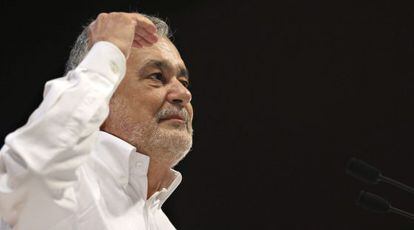“My future is in Andalusia”
Speculation is rising that Andalusia regional premier José Antonio Griñán has his eye on Socialist leadership

After more than a week of speculation and upheaval inside the Socialist Party, stemming from poor results in the October 21 regional races in Galicia and the Basque Country, PSOE members are trying to avoid any more internal debates on whether Alfredo Pérez Rubalcaba should continue as secretary general.
But those discussions will no doubt continue beyond the November 25 Catalonia elections when the Socialists, according to some polls, are also expected to suffer a reverse in the northeast region.
José Antonio Griñán, the Socialist regional premier in Andalusia, is clearly seen as a strong challenger to Rubalcaba if his party decides to search for a new leader.
It was Griñán himself who unleashed a wave of speculation when he answered a question last week in a radio interview over whether he would like to become secretary general. "I never know what I am going to do until that moment comes," he said. The two had a face-to-face encounter on Monday. Following a meeting of the Socialist federal committee, Rubalcaba was asked a similar question: Did he think that Griñán wanted his job?
"That is a question for Mr Griñán. He didn't say anything to me today along those lines, nothing at all. In fact, I believe at one moment he basically said that he was very well set where he is now. But it is not up to me to answer that question."
Griñán didn't clear up matters either when he told the party's executive committee that same day: "My future is Andalusia, above all with Andalusia, in Andalusia and in Madrid," according to sources who described him as being a little irritated over constant badgering over the issue.
Nevertheless, Griñán is seeking a more prominent role within his party — he insists that he commands the greatest number of Socialist members as well as governing the country's most populated region. If Griñán tries to wrest the national party leadership from Rubalcaba, it won't be the first time that these two officials have been at loggerheads. Following Prime Minister José Luis Rodríguez Zapatero's resignation from the party last year, Griñán led a prominent group of Socialist officials who threw their support behind former Defense Minister Carme Chacón, who was running against Rubalcaba.
His campaign to make Chacón the first female secretary general caused a lot of divisions within his own Andalusian Socialist grouping. In February, just weeks before the regional elections in Andalusia were to be held, the party's secretary general in Seville, José Antonio Viera, resigned suddenly over a dispute over the way the election slates were being prepared. Viera, who supported Rubalcaba, charged that he was under pressure to put people on the slates who sided with Chacón. Viera's resignation came just over a week after Rubalcaba won the secretary general's post at the PSOE's 38th convention.
I never know what I am going to do until that moment comes"
Even though the national party race was over, it was still being magnified by the regional dispute.
Griñán first came to the premier's office by anointment. When Andalusia's longtime party baron Manuel Chaves stepped down to join the Zapatero Cabinet in 2009, he announced that he was leaving the premiership after 19 years "in the very good hands" of his economy chief. It didn't take long for the little known Griñán to make bold moves and a name for himself on the national arena.
He shook up the United Left (IU) coalition when he lured its longtime Córdoba mayor, Rosa Aguilar, to join his Cabinet. Aguilar, who had served since 1999, was the IU's only active city mayor.
Then Griñán was left to defend his predecessor's administration after the region's labor force adjustment (ERE) plan scandal broke last year, in which hundreds of people who weren't eligible benefited from generous early-retirement and layoff packages paid for with public money from what was described as a "slush fund for reptiles." The case is still being investigated by a judge.
But the crisis couldn't have come at a worse time for Griñán and his Socialists. Elections were to be held on March 25 and polls showed that the Popular Party (PP) and its regional leader Javier Arenas had a very good shot at wresting power from the PSOE after 30 years in government.
But that PP landslide didn't occur. Arenas' party just won 50 seats in the 109-member regional parliament against the 47 captured by Griñán's Socialists. A party needs 55 seats to claim a majority. After the vote, it became a race to find a coalition partner to form a government.
It took more than a month of negotiations but Griñán was able to convince the IU, which had 12 seats, to join his administration. Arenas resigned as regional PP leader shortly after his defeat.










































